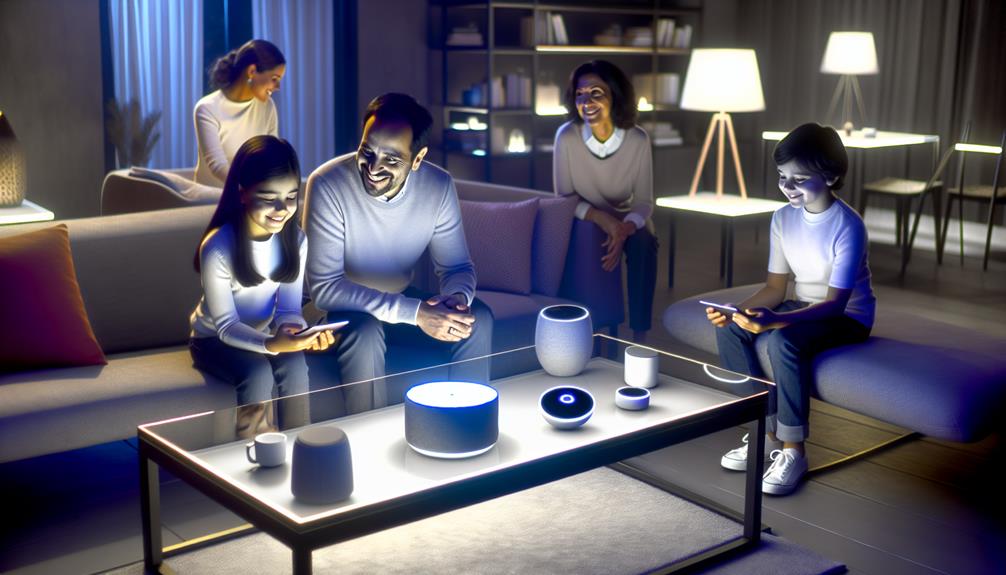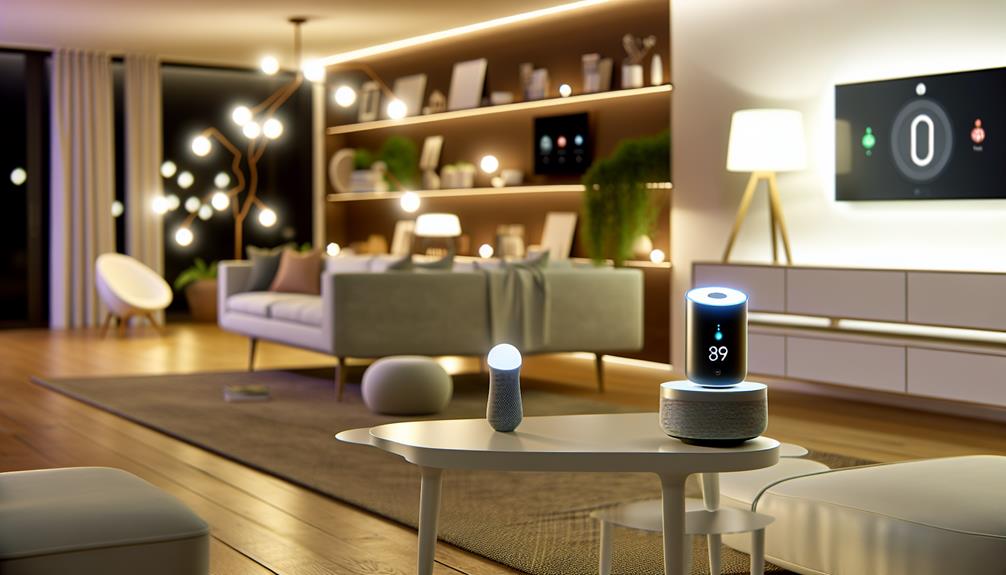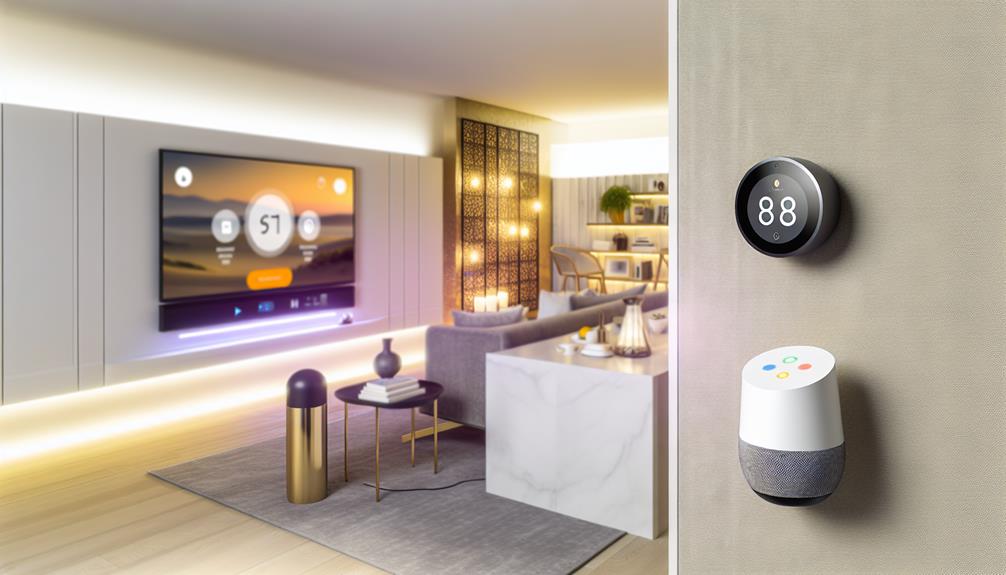Why AI Home Assistants Are Game Changers
AI home assistants have emerged as pivotal innovations in contemporary living, fundamentally transforming how individuals interact with their environments. By facilitating enhanced home automation and energy efficiency, these devices not only provide a seamless user experience but also contribute to increased security and personalized comfort. This integration of smart technology fosters a new level of convenience, ultimately challenging traditional notions of home management. However, the implications of these advancements extend far beyond mere convenience, raising questions about their long-term impact on our daily lives and the future of smart homes.
Key takeaways
- AI home assistants enhance home automation, allowing for smart scheduling and remote monitoring to improve convenience and security.
- They promote energy efficiency by optimizing appliance usage and providing real-time feedback, leading to reduced utility expenses.
- Seamless voice control enables intuitive management of home environments, improving accessibility for all users and enhancing interaction.
- Personalized user experiences foster deeper connections, tailoring settings to individual preferences while improving overall satisfaction.
- Integration with various smart devices ensures seamless interoperability, enriching user experiences and maintaining functionality within smart homes.
Enhanced Home Automation
Enhanced home automation has revolutionized the way we interact with our living spaces, allowing for unprecedented levels of control and convenience. With the integration of AI home assistants, homeowners can now leverage smart scheduling and remote monitoring to create a harmonious living environment tailored to their individual needs.
Smart scheduling enables users to automate daily tasks, such as adjusting lighting, setting thermostats, and controlling appliances, based on their routines and preferences. This not only enhances comfort but also fosters a sense of belonging, as the home adapts to the occupants' lifestyles.
By proactively managing these functions, homeowners can focus on what truly matters—spending time with family and friends.
Remote monitoring adds another layer of security and peace of mind. Users can check the status of their home from anywhere, whether it's ensuring doors are locked or monitoring the activity of children and pets.
This capability fosters a greater connection to one's living space, as individuals can maintain a sense of control even when they are away. Ultimately, enhanced home automation through AI home assistants not only simplifies life but also cultivates a deeper relationship with our homes.
Improved Energy Efficiency
AI home assistants play a pivotal role in improving energy efficiency within households. By leveraging advanced technology, these devices not only enhance convenience but also empower users to make informed decisions about their energy consumption.
Here are key ways they contribute to energy efficiency:
- Smart Scheduling: AI home assistants can learn your daily routines and adjust the operation of appliances accordingly, reducing energy waste during peak hours.
- Energy Monitoring: These systems provide real-time feedback on energy usage, enabling homeowners to identify high-consumption devices and adjust usage patterns.
- Automated Control: By integrating with smart devices, AI assistants can optimize heating, cooling, and lighting, thereby minimizing unnecessary energy expenditure.
- Alerts and Recommendations: Users receive notifications about energy-saving opportunities, fostering a culture of efficiency and awareness within the household.
In embracing these features, families not only contribute to a sustainable environment but also enjoy reduced energy bills, reinforcing a sense of belonging to a community that values sustainability.
The integration of AI home assistants into daily life consequently represents a significant step toward a more energy-efficient future.
Seamless Voice Control
Voice control has revolutionized the way users interact with their home environments, making everyday tasks more intuitive and accessible. By leveraging advanced natural language processing (NLP) technologies, AI home assistants can understand and respond to commands in a conversational manner, enabling users to manage their homes with ease and efficiency. This technology empowers individuals to control lighting, music, and temperature settings simply by speaking, removing the need for physical interaction with devices.
The seamless integration of voice control not only enhances user experience but also greatly improves user accessibility. For those with mobility challenges or visual impairments, the ability to interact with their home environment through voice commands fosters independence and comfort.
Furthermore, the continuous evolution of NLP guarantees that these systems become increasingly sophisticated, allowing for more complex requests and nuanced understanding of user intent.
As society embraces this innovative approach to home management, the sense of belonging within a technologically advanced ecosystem becomes palpable. With AI home assistants, users are not just passive observers but active participants in a smart living experience that caters to their unique needs and preferences.
Personalized User Experience
Customization lies at the heart of a truly personalized user experience with home assistants, allowing these systems to adapt to individual preferences and habits. By harnessing user feedback and leveraging adaptive learning, AI home assistants are transforming how we interact with technology.
The integration of contextual awareness and emotional intelligence enables these devices to offer unique interactions that resonate with users on a personal level.
Key elements of this personalized experience include:
- User Customization: Tailoring settings to reflect individual likes and dislikes enhances engagement and satisfaction.
- Interaction Patterns: Analyzing user interactions allows the assistant to anticipate needs and streamline responses, enriching the overall experience.
- Accessibility Features: Ensuring that all users can easily navigate and utilize the assistant fosters a sense of belonging and inclusivity.
- Emotional Intelligence: Recognizing and responding to emotional cues can notably improve the quality of user interaction, making the experience feel more human.
In this way, AI home assistants not only optimize daily tasks but also cultivate a deeper connection, encouraging users to embrace the technology as an essential member of their household.
Increased Security Features
The integration of increased security features in home assistants marks a significant evolution in the domain of smart home technology. These advancements provide homeowners with enhanced peace of mind, ensuring that their living spaces are safer and more secure.
With capabilities such as intrusion detection, users receive real-time surveillance alerts that notify them of any suspicious activity. This proactive approach allows for immediate remote monitoring, empowering homeowners to keep an eye on their property, even when away.
Furthermore, the incorporation of smart locks and video doorbells facilitates user authentication, allowing residents to manage who enters their home. By implementing various safety protocols, including emergency response features, AI home assistants can automatically alert authorities in critical situations.
This seamless integration of security measures not only protects physical assets but also fosters a sense of community belonging, as neighbors can stay connected and informed about local safety concerns.
Ultimately, as AI home assistants continue to evolve, their increased security features transform them into indispensable tools for modern living, blending convenience with a commitment to safety and enhancing the overall quality of life for users.
Integration With Smart Devices
As AI home assistants enhance security features, their ability to integrate seamlessly with a variety of smart devices becomes increasingly essential. This integration not only boosts the functionality of the home environment but also enriches user experiences.
To guarantee peak smart device compatibility, consider the following aspects:
- Interoperability: Choose AI home assistants that support a wide range of devices, guaranteeing that your smart lights, thermostats, and cameras work harmoniously together.
- User Interface Design: A well-designed user interface simplifies interactions, allowing users to easily control their smart ecosystem without a steep learning curve.
- Voice Recognition: Effective voice command capabilities enable hands-free operation, making it easier to manage devices while multitasking.
- Regular Updates: Ensure your AI home assistant receives regular software updates to maintain compatibility with emerging smart devices and security protocols.
Time and Cost Savings
AI home assistants play a pivotal role in optimizing household efficiency through streamlined task management, allowing users to allocate their time more effectively.
By automating routine activities, these systems not only enhance productivity but also contribute to significant reductions in utility expenses by optimizing energy usage.
As homeowners increasingly adopt these technologies, the potential for both time and cost savings becomes increasingly apparent.
Efficient Task Management
Streamlining daily tasks has become increasingly essential in today's fast-paced world, where time and resources are often stretched thin. AI home assistants excel in efficient task management, enabling users to reclaim valuable time and reduce stress.
By leveraging advanced technology, these devices facilitate smoother daily operations through:
- Task Prioritization: AI assistants analyze user habits and preferences, helping individuals identify which tasks should receive immediate attention, ultimately enhancing productivity.
- Reminder Scheduling: With automated reminders, users can guarantee critical deadlines and appointments are never overlooked, fostering a sense of control and reliability in their busy lives.
- Effortless Integration: AI home assistants seamlessly connect with various smart devices, providing a centralized platform for managing multiple tasks, from grocery lists to home maintenance schedules.
- Time Allocation Insights: By tracking tasks and their durations, these assistants offer valuable insights, allowing users to optimize their schedules and make informed decisions about how to allocate their time effectively.
Incorporating AI home assistants into daily routines not only promotes efficiency but also fosters a sense of belonging, as individuals gain confidence in managing their responsibilities with ease.
Reduced Utility Expenses
Reducing utility expenses has become a key focus for many households seeking to manage their budgets more effectively. AI home assistants play a pivotal role in this endeavor by employing smart scheduling and energy monitoring to optimize energy consumption. By analyzing usage patterns, these intelligent systems can suggest the most efficient times for running appliances, thereby reducing unnecessary energy costs.
Smart scheduling enables homeowners to automate energy-intensive tasks, such as laundry and dishwashing, during off-peak hours when electricity rates are lower. Additionally, AI assistants can integrate with smart home devices, adjusting heating and cooling systems based on real-time occupancy data. This level of automation not only enhances convenience but also translates into significant savings on utility bills.
Moreover, energy monitoring features provide users with insights into their consumption habits, empowering them to make informed decisions about their usage. For example, identifying energy hogs in the household can lead to targeted actions to curb excessive consumption.
Ultimately, AI home assistants foster a sense of belonging by promoting sustainable living while helping families maintain financial stability, ensuring that reduced utility expenses become a shared goal in every household.
Frequently Asked Questions
Can AI Home Assistants Learn My Daily Routines Over Time?
"Knowledge is power," and AI home assistants exemplify this by employing adaptive learning to analyze user behavior. Over time, they facilitate personalized automation, tailoring responses and routines to enhance convenience and efficiency in daily life.
Are AI Home Assistants Compatible With All Smart Home Devices?
AI home assistants generally offer broad device compatibility, integrating seamlessly within a smart ecosystem. However, specific compatibility may vary by brand and model, necessitating careful research to guarantee all desired devices function harmoniously together.
How Do AI Home Assistants Protect User Privacy and Data?
Privacy protection prioritizes personal peace. AI home assistants employ data encryption and emphasize user consent, ensuring sensitive information remains secure. This commitment fosters trust and belonging, allowing users to engage confidently with technology while safeguarding their privacy.
What Happens if My Internet Connection Goes Down?
If your internet connection goes down, AI home assistants often retain offline functionality, allowing limited command execution. Users can resort to alternative controls, such as manual switches, ensuring continued operation and enhancing reliability in challenging circumstances.
Can AI Home Assistants Be Used by Individuals With Disabilities?
AI home assistants greatly enhance accessibility for individuals with disabilities through voice control and personalized settings. They offer hands-free operation, assistive technology, daily reminders, task management, and communication aids, fostering independence and improving quality of life.



